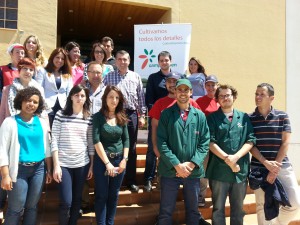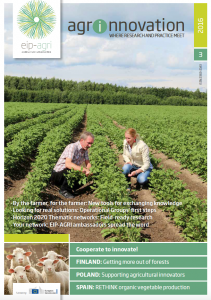Many farmers are actively exploring alternatives in farm management, production methods and resource use, to make their farms more prosperous and resilient in the light of new social and economic realities. The FP7 research project RETHINK highlights innovative and successful connections between farm modernisation and sustainable rural development. One success story highlighted by RETHINK is the organic cooperative ‘Camposeven’, which was founded by seven experienced farmers in the Spanish region of Murcia in 2007. The cooperative produces organic and biodynamic fruits and vegetables, taking advantage of the region’s ideal climatic conditions.
Dr. Karlheinz Knickel from RETHINK says: “We need to reconsider what ‘modernisation’ means. Resource-efficiency, cooperation and sharing knowledge are valuable resources that can help shape stronger production systems and make rural areas more vibrant.
Thanks to its product diversification, Camposeven can adjust to changing market demands and ensure its profitability. The cooperative produces and markets 20 different products, uses both open air and greenhouse production systems, and caters to different types of clients (national, international, supermarkets) with 34% of the products being directly marketed to final customers through online sales.
Camposeven also wants to create a favourable environment where farming partners make decisions together and benefit from different ways of learning (training, informal meetings, experiments on their own farms). By stimulating the farmers involved to exchange knowledge, and by upholding strong partnerships with universities and research groups, knowledge can be created, shared, and efficiently used. The idea behind this approach is that it strengthens the capacity of small farmers to adapt to challenges and opportunities through networking and joint learning.
Innovation and social learning in intensive vegetable production in the Murcia region.
The scale of the case is regional, in Campo de Cartagena, as representative area of intensive agriculture in the Mediterranean coast. The starting point is the analysis of a successful and sustainable process of social learning and innovation, generated from the Transformation of Agrarian Society in San Javier (Murcia). The case study will identify a set of 'good practices' that show the capacity of farmers to adapt through joint efforts and mutual trust (avoiding commercial speculation, generating a policy of trust and transparency jointly with customers), cooperation (informal and institutional, local, regional and international), diversification (new products and new activities), innovation and social learning from networking, and strategic alliances for joint business development. For the collection of expert knowledge and experience about the case study, three complementary instruments will be used: semi-structured interviews, focus group discussions and empowerment evaluations. The case study will be implemented in a participatory manner and visually documented. Core research questions and expected outputs relate to the interpretation of 'farm modernization', the resilience of farming and agricultural land use, and the role of cooperative approaches, alliances and multi-actor networks, as well as effective patterns of project management and public private partnership (PPP), an improved understanding about functioning of innovation as social learning process, and the improved capacity of small farmers for the effective use of knowledge and networking.
More information:
- Innovation and social learning in intensive vegetable production in the Murcia region.
- http://www.rethink-net.eu
- http://www.rethink-net.eu/home.html
- http://www.camposeven.com
- RETHINK: new realities, more diverse farms. SPAIN: RETHINK organic vegetable production http://ec.europa.eu/eip/agriculture/sites/agri-eip/files/eip-agri_agrinnovation_magazine_3_2016_web.pdf
Contact for more information on the case study:
Prof. Ignacio de los Ríos Carmenado
E-mail: ignacio.delosrios@upm.es Tel.: +34 91 336 36 86


